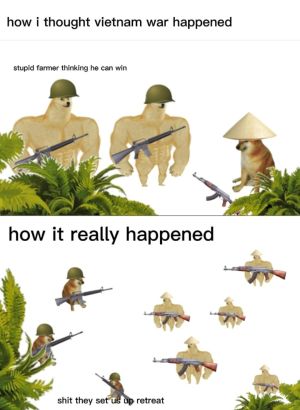Vietnam War
🇺🇸💸 The Vietnam War: How America Burned Its Gold, Its Credibility, and Still Lost to Farmers in Flip-Flops 🌾💥
Once upon a time, the United States sat atop the global economy like a smug king on a golden throne—literally. Post-WWII, America owned over half of the world’s gold reserves, nearly 20,000 metric tons glittering in Fort Knox, while the rest of the planet scrambled to rebuild from the carnage. The Bretton Woods system pegged the world’s currencies to the U.S. dollar, and the dollar to gold at $35 an ounce.
It was the perfect racket.
But then, in true Cold War paranoia, America decided it needed to “save” Southeast Asia from the creeping red tentacles of Communism. And so, the Vietnam War began—a slow, expensive bleed that would suck away not just American lives, but its golden economic throne.
🏅 The Vietnam War: Fighting Communism, One Bad Decision at a Time
From the start, the Vietnam War wasn’t just a military conflict—it was a PR stunt fueled by Cold War ego. The domino theory had Washington convinced that if Vietnam fell to communism, the rest of Asia would topple like a Jenga tower.
The plan? Bomb them into democracy.
But Vietnam wasn’t playing that game. The Viet Cong weren’t interested in big, flashy battles. They were the kings of guerrilla warfare—melting into jungles, tunneling underground, and turning every rice paddy into a potential death trap.
Meanwhile, America sent in green, inexperienced soldiers, often drafted straight from suburbia, who were suddenly dropped into a jungle nightmare. Add in questionable tactics like Agent Orange, mass bombings, and an overreliance on sheer firepower, and it became clear:
The U.S. was playing chess. The Viet Cong were playing jungle hide-and-seek.
💸 The True Cost? Gold. Lots of Gold.
War is expensive. War fought poorly? Even more so.
The Vietnam War cost the U.S. over $168 billion (about $1 trillion today), but the real economic wound was to its gold reserves. Under Bretton Woods, foreign countries could convert their dollars into U.S. gold. And as the war dragged on, the world started to notice America’s reckless spending.
Countries began cashing in their dollars for real gold—France’s Charles de Gaulle even sent a battleship to physically collect his gold share—and Fort Knox started to look a little emptier.
By the time the dust settled, U.S. gold reserves had been cut in half, down to around 10,000 metric tons.
💊 Propaganda, Psychedelics, and a Nation Losing Its Grip
Back home, the propaganda machine worked overtime:
- “We’re winning!”
- “Freedom is on the march!”
- “Don’t mind the body bags on the evening news!”
But Americans weren’t buying it. Televised coverage brought the war into living rooms nationwide, and the images weren’t pretty. Protesters flooded streets. College campuses erupted. Soldiers, disillusioned and drug-riddled, returned home broken—if they returned at all.
By 1971, the dollar was on life support. With countries draining U.S. gold reserves, Nixon panicked and pulled the plug on Bretton Woods with his infamous “temporary suspension” of gold convertibility. This move—aka the Nixon Shock—officially decoupled the dollar from gold and threw the world into the floating currency chaos we live with today.
🏆 The Grand Finale? America Lost.
Despite all the spending, all the bloodshed, and all the propaganda, the U.S. still lost to Communist Vietnam.
The fall of Saigon in 1975 was the ultimate humiliation: tanks rolling into the U.S. embassy, helicopters frantically evacuating Americans, and the haunting image of the last chopper leaving the roof as North Vietnamese forces closed in.
All that gold, all that debt—gone, and for what?
🤔 What If America Just… Didn’t?
Now, here’s the real kicker: What if the U.S. had just minded its own business?
- No Vietnam War? That’s potentially 10,000 metric tons more gold still chilling in Fort Knox.
- No Nixon Shock? Bretton Woods might have limped along a few more decades, or maybe even evolved into something sturdier.
- No generational trauma? The ’60s and ’70s cultural upheaval wouldn’t have been fueled by the anti-war movement.
Instead of bleeding money in jungles, the U.S. could’ve continued riding the post-WWII economic high, investing in infrastructure, innovation, or—hell—just buying more gold to flex even harder.
💡 The Takeaway?
Vietnam wasn’t just a military failure—it was an economic catastrophe. The war revealed that America’s exorbitant privilege—the global trust in the dollar—had limits. Once Nixon had to unshackle the dollar from gold, the era of “infinite money glitch” began, but at the cost of credibility and stability.
The U.S. didn’t just lose to the Viet Cong.
It lost half its gold, its iron grip on the world economy, and—most painfully—its sense of invincibility.
All because it couldn’t resist stepping into a war that was never its fight to win.
